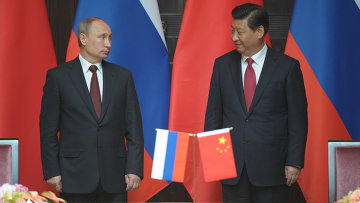
By Ankit Panda
If you haven’t already read it, Gilbert Rozman has an incisive essay over at Foreign Affairs that explains why the contemporary iteration of close bilateral ties between Russia and China is here to stay. Rozman argues that we’re not about to see a rehash of the Sino-Soviet split anytime soon for a variety of reasons — most related to national identity and ideology. What makes Rozman’s argument remarkably convincing in my view is the complete absence of the United States’ policy and position in Asia as a causal force in driving China and Russia together. Indeed, under Putin and Xi, China and Russia have come together organically as both country’s ideological directions and geopolitical impulses have converged. While the two aren’t formal allies (and won’t be anytime soon), their potential combined impact on international relations in Asia and the world at large should not be understated.
At the core of today’s convergence between Russia and China is the common idea that the existing international order needs at least an alternative, and at most a complete overhaul. Both countries’ elites experienced the global financial crisis of 2008 in similar ways and walked away from that experience with a degree of vindication that the Western way was by no means adequate. Similarly, Rozman notes that contemporary intellectual elites in both Russia and China have convincingly cast the West as a nefarious imperialist force, culpable for current unrest in Ukraine and Hong Kong. Given the prevalence of these narratives in both countries, nationalism remains directed at the West and not at the other.
To be sure, Russia-China bilateral relations are by no means free of conflicting geopolitical interests. For example, Russia continues to serve as a primary source of arms for India and Vietnam — two countries with which China continues to actively wrangle over territorial issues. Based on open source information, it appears that Beijing has begrudgingly accepted the role that foreign military sales play in Russia’s overall foreign policy. Meanwhile, as Putin prepares to turn his vision for a Eurasian Union into reality, it’s hard to ignore Beijing’s growing status as a regional and global leader. With the Shanghai Cooperation Organization, the Conference on Interaction and Confidence-Building Measures in Asia, BRICS and its “March West” policy, Beijing stands to overshadow Moscow in the Eurasian heartland in the coming decades. Although many of these institutions include Russia, Beijing’s influence outweighs Moscow’s considerably. As Rozman notes in his essay, Russian officials are wary of directly referencing China’s rise in official rhetoric to avoid the uncomfortable nationalist impulses that arise from acknowledging a decline in relative power vis-à-vis a neighbor. Instead, Russia-China diplomatic rhetoric is squarely focused on the positive sum — one prominent recent example includes the $400 billion natural gas deal the two countries signed this summer.
Rozman and other optimists about the strength of current China-Russia ties stop short of acknowledging the increasing lopsidedness of the partnership. In essence, under the current economic and geopolitical realities, Russia needs China far more than China needs Russia. Amid worsening ties with Europe (just as the price of oil nosedives), Russia has little option but to tether itself to the former Soviet space and to China. China is aware of Putin’s fragile position. Informed speculation regarding the terms of the natural gas deal signed between Russia and China earlier this year suggests that Russia may have conceded on pricing to seal in the deal — a coup for Putin in the short term, but a potential financial sinkhole for Russia over the 30-year term of the agreement.
As I reflect on Rozman’s arguments, another potential weak link that stands out in China-Russia ties is the potential departure of Putinism from Russian politics. While this seems unimaginable today, seeing as how a “Putin doctrine” colors every corner of Russian foreign policy, short of an actual autocratic revolution, Russia will have a new leader in the future. Assuming current economic trends persist, Russia’s next leader may be elected solely on the basis of economic revival. In this context, it’s imaginable that a moderate, Medvedev-esque figure could return to the helm at the Kremlin with an Atlantic gaze, proffering better relations with Europe and the United States. While much of this remains in the realm of speculation, there are good reasons to believe that Putin’s surge in popularity following Russian chauvinism in Ukraine will be ephemeral.
A stable and long-term alignment between Russia and China will undoubtedly be a formidable force in international relations. Both states are serious participants in international diplomacy as permanent members of the United Nations Security Council, and play critical roles in specialized diplomatic processes such as the ongoing nuclear negotiations with Iran and the Six Party Talks with North Korea. If, as Ian Bremmer has argued, we’re heading into an uncertain era of G-Zero – a world where U.S. hegemony is moribund with no clear successor — Russia and China will almost certainly emerge as a powerful bloc.
At this point, everyone takes the rise of China seriously while dismissing Russia as a sick old bear, led by elites nostalgic for its Soviet heyday. The current U.S. president dismissed Russia as a weak regional power. While that may be the case, it is too soon to write off the current convergence between Russia and China as a temporary marriage of convenience. With a powerful confluence of ideology and national interests, it’s time for policymakers, especially in the West, to take the China-Russia partnership seriously.

 November 27, 2014
November 27, 2014  Опубликовано в
Опубликовано в